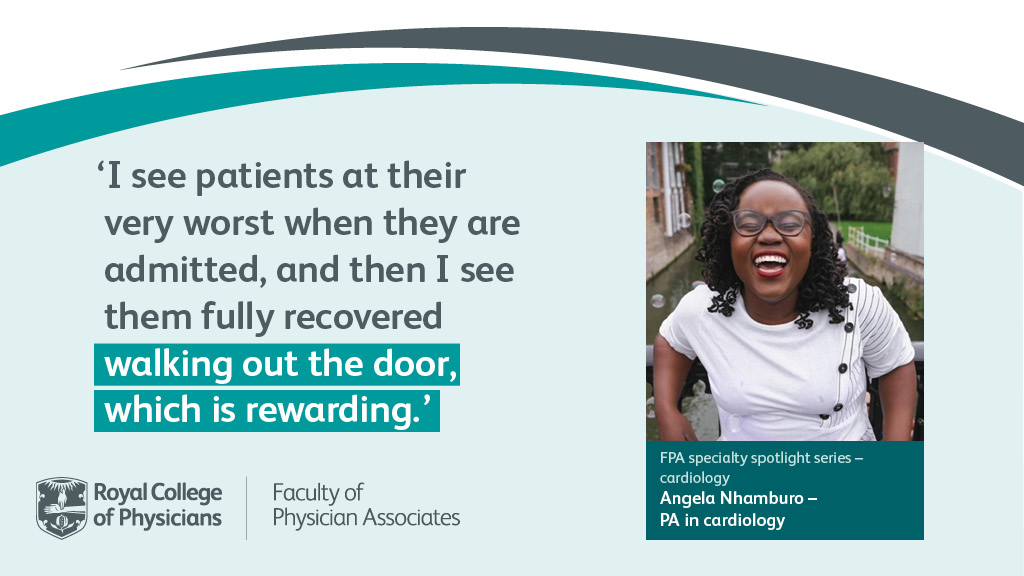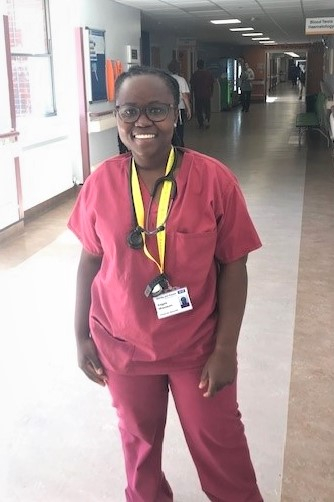Spotlight series – PAs in cardiology
Cardiology focuses on diseases of the cardiovascular system. A growing number of physician associates (PAs) are practising in the specialty, including Angela Nhamburo. Angela qualified as a PA from Anglia Ruskin University in March 2020, just as the COVID-19 pandemic began. Having worked in cardiology for 7 months, she shares her experience of being a newly qualified PA.
What made you decide to become a PA?

Ever since I was a little girl, I always wanted to work in the medical field – I just wasn’t sure in which area. I bounced between a number of ideas, including becoming a pharmacist. I studied biomedical science as my undergraduate degree and found that I enjoyed science, and I was good at it. After graduating, I got a job at Addenbrookes Hospital as a specimen receptionist and supported the laboratory teams. I saw how busy and fast-paced the role was, and would always peek into the labs to see what was happening.
After graduation, and a few months of running samples, I quickly realised I wanted to work in a patient-facing role. I researched options online, and the PA role kept appearing. I had never heard of PAs before or come across them. When I started researching, I felt excited and knew the role sounded perfect for me. When I started applying, I got a rejection and thought it wasn’t going to work out for me. I stayed positive, kept applying, and was accepted onto the course at Anglia Ruskin. It was a trial course, and I was part of the first cohort to qualify. My PA career has since accelerated.
Can you tell us more about your experience of working as a PA in cardiology?
In hindsight, before qualifying as a PA, my quality improvement project was on the management of cardiology patients. When I was an undergraduate, I worked as a healthcare assistant. I thoroughly enjoyed a ward I knew as K3. It wasn’t until I pieced everything together recently that I realised it was the cardiology ward. I loved my time there and supporting the patients. While they were acutely unwell, they seemed motivated to make lifestyle changes to help their conditions.
I qualified just as the pandemic was beginning in England and accepted the first role I was offered. It was a fixed-term role, and the trust had 30 PAs. I met a PA working on the cardiology ward there. Her confidence, and seeing how much she enjoyed her role, really stood out to me. When my contract came to an end, I sought a role in cardiology – I felt that my job was made for me, and I was convinced it would be mine. I have been here for 7 months, and I absolutely love it. It is a fast-paced and challenging environment. I see a range of cases, from emergencies to relatively stable patients. It is definitely a specialty that keeps me on my toes, and I thrive on this every day.
What diagnostic/investigation/procedural skills have you gained?
I am the only PA at my trust working in cardiology. My role is split between 80% clinical and 20% admin/managerial aspects, and I feel blessed to be in this position. One of the most used terms on our ward is, ‘Oh, Angela will know’, as I am the person who is constantly here. I see patients at their very worst when they are admitted, and then I see them fully recovered walking out the door, which is rewarding. My role as a PA within the team is to eventually specialise in heart failure, building up autonomy and confidence in reviewing patients while further developing my leadership skills.
This requires handling a vast amount of information, including taking a full history from patients to help identify the investigations they require. I enjoy this aspect as I continually gain new knowledge. I’m learning a range of practical skills too. These include, but are not limited to, venepuncture, cannulation interpreting electrocardiograms, and assisting in the review of various scans (ECHO, MRI etc).
The administrative side of my role involves working collaboratively with all members of the cardiology multidisciplinary team. We're based across two hospitals, and we also have a community heart failure team. I coordinate the rota for the junior team, specifically looking after student PA placements (and any other students on the ward).
How would you describe the impact your role as a PA has had?

Before I joined, my trust had wanted a PA for the cardiology department for a while, and I feel privileged that I have this role. The most important duty I have is to be a constant team member supporting patients and staff. The level of gratitude that is shown by patients has helped me to recognise the positive impact my role has had. A recent example was a patient who was grateful to see a familiar face week after week; the patient had been admitted for over 4 weeks, can be all the more difficult with shift changes. Eventually he was discharged and brought in very generous gifts as a thank you, which was humbling.
Just this week, a patient commented that I was a great communicator. It’s not something that I had previously thought about, but it is important for patients to feel comfortable when are staying with us for long periods. It helps to have a familiar face every day and to hear a consistent voice to talk through their concerns with.
What do you find most enjoyable and rewarding about being a PA?
The PA role is a perfect fit for my personality, as it is a fast-paced environment and every day offers a new challenge. I’m still new to my role, and I thrive when learning. If there is a condition I’m not sure of, I discuss it with my consultant and then read up about it to educate myself – I love being challenged academically.
I also thoroughly enjoy the daily interactions I have with patients. Interpersonal skills aren’t something that can be taught by reading a textbook. It is humbling when patients share a small glimpse of their life or what has led them to our care. The PA role has already taught me so many life lessons. The main one is the brevity of life and that it is so precious. I feel so lucky that I meet incredible people on a daily basis.
What challenges do you face as a PA working in cardiology?
The biggest current challenge is the fear of limited progression options and the lack of regulation. I sometimes feel I am gaining new knowledge and will never be able to apply it fully. I see our junior doctors rotating and progressing to their next level of training and wonder when structured PA progression (regulation) will come.
The most famous challenge is prescribing. It makes life difficult, particularly when we are short-staffed and before weekends and bank holidays when we are trying to anticipate discharges. Rotational work can be a challenge when new staff doesn’t know what the PA role is about – it can be frustrating explaining my scope of practice, and what I can do.
What does the future look like for you as a PA?
Cardiology is a specialty that fits my career path and ambitions. I plan to remain here and continue to grow my skills and knowledge. My consultants are very ‘pro-PA’, and I am grateful for that. They have invested a lot in me already. I constantly feel supported and encouraged by them. I’m hoping that I will be joined by additional PAs in the future, both in my specialty and the wider hospital team.
What advice would you give to a PA looking to work in cardiology?

Becoming a PA is so rewarding. When you’re caring for patients, providing continuity of care, and seeing how you’re helping them feel better, it makes all the difficult times worth it. It isn't a perfect job, and it can be emotional, especially when patients pass away. I would say it is important to love what you’re doing, because on those difficult days, if you still enjoy it, it makes the hard times bearable. When searching for jobs, keep in mind what you do and do not enjoy. Keep that thought in your mind, even when you’re getting desperate. Your perfect role is out there, and when you secure it, you’ll feel so fulfilled.
We’re always looking for qualified PAs who are FPA members to share their stories. If you’re interested in sharing yours, get in touch using the contact details below. If you’re thinking of a career as a PA, you can learn more about how to begin your journey here.
Get in touch to share your PA story:
Jenna Donaldson – FPA communications officer
